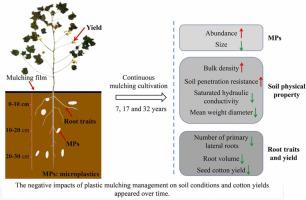Journal of Hazardous Materials ( IF 13.6 ) Pub Date : 2022-07-25 , DOI: 10.1016/j.jhazmat.2022.129586 Bingshen Liu 1 , Wenfeng Li 2 , Xiangliang Pan 3 , Daoyong Zhang 4

|
Plastic mulching has been extensively used for near 40 years in China because of the commonly recognized trade-offs between economic profit and adverse impacts. Whether the trade-offs is well kept after decades of mulching usage is poorly understood. In this study, microplastic (MP) pollution, soil physical properties, as well as the root traits and yields of cotton under plastic mulching for different years (up to 32 years) in northwest China were investigated. The results showed that average abundance of MPs in soil ranged from 28.00 to 1426.67 items kg−1 and increased with time whereas size of MPs decreased with time. With respect to soil physical properties, bulk density and penetration resistance significantly increased with mulching time while saturated hydraulic conductivity and mean weight diameter of water-stable aggregates in cotton fields decreased over time, indicating that long-term plastic mulching has irreversible adverse impact on soil function. The significantly increased soil penetration resistance and decreased hydraulic conductivity substantially restricted root growth and this finally led to remarkable reduction of seed cotton yield. It is urgent for the agricultural departments to take appropriate measures to mitigate the constantly increased negative trade-offs of plastic mulching in the arid areas.


























 京公网安备 11010802027423号
京公网安备 11010802027423号